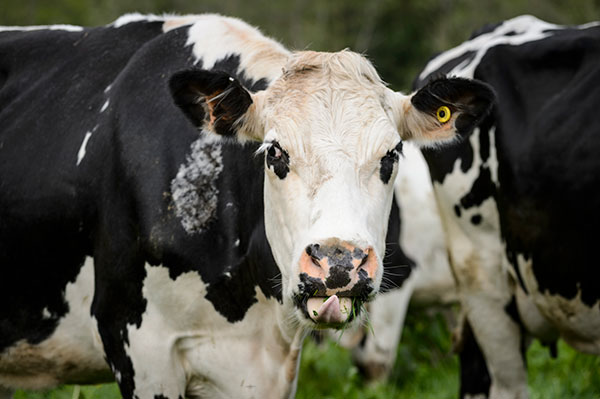Consumers face a potentially confusing mix of messages in January as campaigns supporting either meat-eating or a vegan diet go head-to-head for their attention.
In response to the global Veganuary movement, a lobby group for the meat and dairy sector, the AHDB, will launch an advertising drive and social media campaign to encourage the consumption of meat and dairy.
Through a £1.5 million TV and digital advertising campaign called ‘Eat Balanced’, the group said it aims to respond to the increased negativity surrounding meat and dairy.

The campaign is based around the nutrient benefits of eating red meat and dairy, including vitamin B12 and iron, and which it says “are not naturally present in a vegan diet”.
Before its official launch, the news has already reignited a polarised debate on meat versus vegan diets on social media, with livestock farmers pointing out the accuracy of the nutrient information, and vegan proponents claiming that livestock is often fed nutrient additives. Others have questioned whether such a divisive campaign approach is useful at all.
The AHDB is also promoting the high food and farming standards in the UK, and has launched a new website with further information, and recipes.
“Our farmers operate to some of the highest standards in the world and this campaign aims to balance the negative commentary around farming as well as the importance of eating red meat and dairy as part of a balanced and healthy diet,” said the AHDB chief marketing and communications officer, Christine Watts.
Susie Stannard, AHDB’s consumer insight manager, said the campaign would targeting consumers open to reducing their red meat and dairy consumption.
“Our research has shown about one-in-five people are waverers and this is likely down to them seeing some negative news about red meat or dairy, either from an animal welfare point of view or the environment which has become a big factor in recent years,” Stannard told the Farmers Guardian.
Meanwhile the Veganuary campaign, the global pledge to try a vegan diet for 31 days, have recruited celebrities as ambassadors to share their top reasons to try vegan.
Ambassadors include reality star James Moore, actor Peter Egan, and Harry Potter actor Evanna Lynch and the 2021 campaign hopes to build on last year, when 400,000 people from 192 countries participated in the month.
Presenter of BBC’s Springwatch and vegan Chris Packham, has also lent his voice to the movement.
“Trashing the planet does none of us any good, as the coronavirus pandemic shows all too clearly. But we can emerge from this stronger and wiser, with a renewed commitment to protecting the environment, its inhabitants and our own futures. Being vegan is a great way to support the natural world and to live sustainably.”
Despite the profile of the Veganuary campaign, less than two per cent of the UK population are fully vegan, according to the Vegan Society.













I think vegans individually like the completeness and perfection of being totally vegan but the reality is their numbers are low. The better angle I think is that people can choose to cook & eat vegan without needing to BE vegan. Sorry but I want to carry on buying Ecover products even though they experiment on single-celled animals.
Totally distracted! The main reason I visited was to ask if anyone knows whether this:
https://www.theguardian.com/environment/2020/dec/23/organic-meat-production-just-as-bad-for-climate-study-finds
has been debunked? Surely its wrong?
Hi adam42, you may find this article by Riverford founder Guy Singh-Watson interesting in response to that study – his feeling is that it has too much of a single focus, ignoring other benefits of organic including lower carbon impact and greater biodiversity ),https://wickedleeks.riverford.co.uk/news/climate-change-organics-biodiversity/organic-climate-report-naive-says-riverford-founder
Thanks. I highly suspect that the researchers are making a similar kind of insidious mistake with the units they are using like I highlighted about a similar study:
https://carbonwatchdog.org/go-vegan-to-stop-climate-change-it-should-be-obvious/
but in that case it wasn’t comparing like-for-like as it is here. I’ll have to dig out the original source that the Grauniad article is quoting.
I sign up for the vegan yard emails every year but I’m going to be v open and say I struggled with fertility and have almost no periods and only became pregnant when I forced myself to eat a steak a week. I am a big eater or dairy as I can’t get my head round how almond milk from abroad in a tetrapak can be better than local milk but I rely on dairy for calories… I support balance and local eating as I’m fed up feeling guilty about failing to become a full vegan
I was the same, a big consumer of dairy for calories (demanding athletic pursuits and being a 6’3″ 14 stone male), until somebody educated me as to how dairy cows are treated. It was abhorrent and incredibly cruel, although of course there are some more ethical dairies now. I had to take the time to learn about vegan nutrition and have since found it easy, with no loss of strength or athletic ability !! Don’t feel guilty about not being a full vegan, you sound like you at least care where and how your food is supplied. We all should always work together, not this ridiculous divisive approach as mentioned in the report above.
What a difficult discussion to have? I think the arguments get too divisive. One side wants us all to be out and out vegans and I suppose the other fears a loss of income.
The truth is, with the smallish, but growing number of vegans, the children growing up with vegan parents is small. For the rest it’s not till they, see a film showing animal cruelty or start to think where does my food come from, that they think about the power of what they put in their mouths.
We are all in fact on a journey and and have to make up our own mind about the health and other claims re eating a more plant centred way. It seems to me that eating the way we do at the moment will destroy the planet. You could argue about avocadoes, but say my few come from Spain or my Soya comes from Europe, but we all make an impact with our food choices!
Saying our country ‘has some of the highest welfare standards in the world’ does kind of overlook the fact that even if farmers say they love their animals, they will eventually die! And pictures of chickens crammed into big sheds to poorly to hardly stand and falling over their dead friends does not help.
Then there’s the whole discussion around a ‘well balanced’ diet. As if eating chicken wings and drinking coke is ok, but you will need a carefully thought out vegan diet.
In truth the food we put in our mouths three or more times a day needs to be considered, because ‘food is our medicine and medicine is our food’.